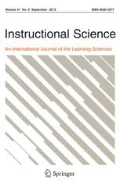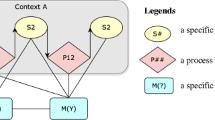Abstract
Students' alternative frameworks (frequently regarded as misconceptions) play a crucial role in science concept learning. Accumulated research findings indicate that alternative frameworks are resistant to extinction despite formal instruction.
This paper presents an instructional strategy based on the thesis that science concept learning involves cognitive accommodation of an initially held alternative framework. The strategy consists of three phases: (1) exposing alternative frameworks, (2) creating conceptual conflict, (3) encouraging cognitive accommodation. The first phase is facilitated through an “exposing event,” while the second and third focus on a “discrepant event.”
The authors have used previous research findings about student alternative frame-works for the structure of a gas to create exposing and discrepant events for an introduction to the particle model of gases. The paper presents a case study of two lessons in a sequence on the particle model, accompanied by an analysis of the phases of the instructional strategy employed for cognitive accommodation.
Similar content being viewed by others
References
Anderson, R. C. (1977). “The notion of schemata and the acquisition of knowledge,” in R. C. Anderson, R. J. Spiro and W. E. Montague, (eds.), Schooling and the Acquisition of Knowledge. New York: John Wiley and Sons. Chapter 12, pp. 415–431.
Archenhold, W., Driver, R., Orton, A. and Wood Robinson, C., (eds.), (1980). Cognitive Development Research in Science and Mathematics. Leeds, England: The University of Leeds.
Ausubel, D. P. (1963). The Psychology of Meaningful Verbal Learning, New York: Grune and Stratton.
Ausubel, D. P., Novak, J. D. and Hanesian, H. (1978). Educational Psychology: A Cognitive View. New York: Holt, Rinehart, and Winston. (First edition by Ausubel, 1968)
Berlyne, D. E. (1965). “Curiosity and education,” in J. D. Krumboltz, (ed.), Learning and the Educational Process. Chicago: Rand McNally & Co.
Brown, H. I. (1977). Perception, Theory and Commitment: The new Philosophy of Science. Chicago: The University of Chicago Press.
Brumby, M. (1979). “Problems in learning the concept of natural selection,” Journal of Biological Education, 13: 119–122.
Champagne, A. B., Klopfer, L. E. and Anderson, J. (1980). “Factors influencing learning of classical mechanics,” American Journal of Physics 48: 1074–1079.
Clement, J. J. (1979). “The Role of Preconceptions and Representational Transformations in Understanding Physics and Mathematics,” Amherst, Mass.: Department of Physics and Astronomy, University of Massachusetts.
Cosgrove, M. and Osborne, R. (1981). “Physical Change”. A Working Paper of the Learning in Science Project, University of Waikato, Private Bag, Hamilton, New Zealand.
Deadman, J. A. and Kelley, P. J. (1978). “What do secondary school boys understand about evolution and heredity before they are taught the topics?” Journal of Biological Education, 12: 7–15.
Dewey, J. (1910). How We Think. Boston: Heath.
di Sessa, A. A. (1981). “Unlearning Aristotelian Physics.” MIT Education Division, working paper.
Driver, R. and Easley, J. (1978). “Pupils and paradigms: A review of literature related to concept development in adolescent science students,” Studies in Science Education, 5: 61–84.
Erickson, G. (1980). “Children's viewpoints of heat: A second look,” Science Education, 64: 323–336.
Festinger, L. (1957). A Theory of Cognitive Dissonance. New York: Harper and Row.
Hawkins, D. (1978). “Critical barriers to science learning” Outlook, Issue 29, Autumn.
Johnstone, A. H. and Kellet, N. C. (1980). “Learning difficulties in school science-Towards a working hypothesis,” European Journal of Science Education, 2: 175–182.
Kargbo, D. B., Hobbs, E. D. and Erickson, G. L. (1980). “Children's beliefs about inherited characteristics,” Journal of Biological Education, 14: 137–146.
Karplus, R. (1977). “Science teaching and the development of reasoning,” Journal of Research in Science Teaching, 14: 169–175.
Karplus, R. and Stage, E. K. (1981). “Misconceptions in Science: Past Work and Present Approaches,” Group in Science and Mathematics Education, University of California, Berkeley, California, 94720.
Kuhn, T. S. (1970). The Structure of Scientific Revolutions, Second edition, Chicago: University of Chicago Press.
Lefrere, P. (1981). “Making use of the knowledge you have,” Instructional Science, 10: 1–4.
Lewis, B. N. (1981). “An essay on error,” Instructional Science, 10: 237–257.
Marton, F. (1981). “Phenomenography — deseribing conceptions of the world around us,” Instructional Science, 10: 177–200.
McClosky, M., Caramazza, A. and Green, B. (1980). “Curvilinear motion in the absence of external forces: Naive beliefs about motion of objects,” Science, 210: 1139–1141.
Niesser, U. (1976). Cognition and Reality. San Francisco: W. H. Freeman and Co.
Norman, D. A. (1980). “Twelve issues for cognitive science,” Cognitive Science, 4: 1–32.
Norman, H. F. and Clement, J. L. (1981). “Student misconceptions of an electric eircuit: What do they mean?” Journal of College Science Teaching, 10: 280–285.
Novak, J. D. (1977). A Theory of Education. Ithaca, NY: Cornell University Press.
Novick, S. and Nussbaum, J. (1978) “Junior high school pupils' understanding of the particulate nature of matter: An interview study,” Science Education, 62: 273–281.
Novick, S. and Nussbaum, J. (1981). “Pupils' understanding of the particulate nature of matter: a cross-age study,” Science Education, 65: 187–196.
Nussbaum, J. (1979). “Children's conceptions of the Earth as a cosmic body: A cross-age study,” Science Education, 63: 83–93.
Nussbaum, J. and Novick, S. (1982), “A Study of Conceptual Change in the Classroom,” paper presented at the NARST Meeting, Lake Geneva, Wisconsin, April.
Piaget, J. (1962). “Comments on Vigotsky's critical remarks,” in L. S. Vigotsky, Thought and Language, Cambridge: MIT Press and J. Wiley.
Piaget, J. (1964). “Development and learning,” Journal of Research in Science Teaching, 2: 176–186.
Posner, G. J., Strike, K. A., Hewson, P. W. and Gertzog, W. A. (1981). “Accommodation of a scientific conception: Toward a theory of conceptual change,” Science Education, (in press).
Rumelhart, D. E. and Ortony, A. (1977). “The representation of knowledge in memory,” in R. C. Anderson, R. J. Spiro and W. E. Montague, (eds.), Schooling and the Acquisition of Knowledge. New York: John Wiley and Sons.
Suchman, J. R. (1962). The Elementary School Training Program in Scientific Inquiry. Urbana: University of Illinois.
Toulmin, S. E. and Goodfield, J. (1962). The Architecture of Matter. Harmondsworth: Penguin.
Toulmin, S. (1972). Human Understanding, Princeton: Princeton University Press.
Viennot, L. (1979), “Spontaneous reasoning in elementary dynamics,” European Journal of Science Education, 1: 205–221.
Wittrock, M. C. (1977). “Learning as a generative process,” in M. C. Wittrock, (ed.), Learning and Instruction. Berkeley, Calif.: McCutchan, pp. 621–631.
Author information
Authors and Affiliations
Additional information
Based on a paper presented at the AERA convention, Los Angeles, California, April, 1981.
This paper was prepared while the first author was a visiting professor at Cornell University, Ithaca, New York.
Rights and permissions
About this article
Cite this article
Nussbaum, J., Novick, S. Alternative frameworks, conceptual conflict and accommodation: Toward a principled teaching strategy. Instr Sci 11, 183–200 (1982). https://doi.org/10.1007/BF00414279
Issue Date:
DOI: https://doi.org/10.1007/BF00414279




